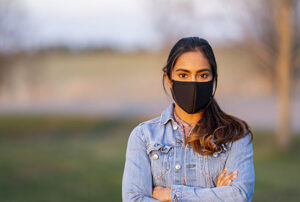Five Tips for Helping Teens Follow COVID-19 Protocols
It’s easy for parents to think their teenagers know what they’re doing. They sure act like they do. For instance, do you assume your super-responsible (or not so responsible) kiddos are taking COVID-19 precautions seriously, always wearing a face mask, using hand sanitizer and social distancing at school, work, or with friends?
Well, maybe you shouldn’t.

Adolescent girl standing outside wearing a protective mask. (cdc.gov)
I know, because I’m guilty of not sharing some really important information with my kids. When our younger daughter was in her late teens, she brought a parental failing to my attention. One that I shouldn’t have missed.
“Why didn’t you ever tell me not to drink and drive?” she said, popping into our bedroom one night to let us know she was home safe
“Because I thought you knew better,” I said, shocked by the question and stunned at my dereliction of duty. I had thought this was common knowledge, that you don’t get behind the wheel if you’ve been drinking. We knew of people who’d died in DUI accidents. If she hadn’t picked up the message from her parents’ example, surely, she’d have gotten it from a school health class, driver’s ed, or on TV. But she was right. I never had “the talk” with her. Or with our three other children. I suspected that one of her friends had been drinking and driving, because our daughter didn’t have a car. The thought of it scared me to death.
During these times of unchecked community spread of COVID-19, parents need to make sure they’re having “the talk.” And repeating it until their teens “get it.”
After COVID-19 was recognized in Taiwan in early 2020, health authorities stepped up prevention and intervention activities to help stop the spread in schools and universities. “At the individual level, suggested preventative behaviors included: i) maintaining good personal hygiene, ii) developing a healthy lifestyle with proper diet, regular exercise, and adequate rest, iii) ensuring adequate ventilation at home and in the office, and iv) wearing masks, especially for those with preexisting respiratory tract infections.” (https://www.ncbi.nlm.nih.gov/pmc/articles/PMC7296276/)
The CDC’s Parent Resource Kit for the Social, Emotional, and Mental Well-being of Adolescents during COVID-19 offers ideas for helping teens through the hard-hitting challenges they’re facing: The loss of a breadwinner’s job, for instance, the loss of school classes, teachers and activities, changes in their daily routine, and the loss of special events that mark important milestones, like prom and graduation. (https://www.cdc.gov/coronavirus/2019-ncov/daily-life-coping/parental-resource-kit/adolescence.html)
Not sure if your teen is complying with your family protocols? Here are five ideas to help them accept reality, and to keep everyone safe.
- Buy or make different mask styles for your teenager to try out. Supply them with several of the type they agree to wear. Demonstrate (yes – demonstrate!) how you want them washed. (Masks should be double-thickness if possible, one layer should be made of high-quality quilter’s cotton, the other layer a synthetic.) Make sure to have an “in” and “out” mask basket for use by the door.
- Create a family protocol list for exiting and entering the house. Post it on the door. Daily protocols should include hand washing upon coming home. Also, disinfecting cell phones. (Unplug and turn off. Then wipe with 70% alcohol and a cotton ball or a clean microfiber cloth sprayed with disinfectant.) Leave shoes at the door.
- Set up a protocol table, a card table for instance, near an entrance or in the garage. This can serve as a place for your mask in-and-out baskets, disinfectant wipes, and extra hand sanitizer for on-the-go. Teens can deposit any items they’re bringing into the house on the protocol table, as a reminder that they have a responsibility to wipe things down with disinfectant wipes. Hang coats instead of tossing them on the couch or bed. Provide a place where they can air out.
- If their school, sports or group activities have been cancelled, make sure you are empathetic about their loss. Talk to them about it. Dealing with COVID-19 is mentally exhausting and the isolation can cause depression in teens. It’s devastating at that age to have to give up what you love. Help them realize that it will end. And make sure they’re still getting physical activity. (YouTube channels offer a plethora of options, including dance and yoga.) Do fun family activities together. Take a hike. Roast hot dogs on a grill. Make food for an elderly relative. Watch a favorite old movie or TV series together. Play a trivia game. Hang a world map and learn foreign countries together. Help them stay connected!
- If you don’t feel comfortable with your teenager riding in their friends’ cars, due to possible COVID spread, just say no. You will need to arrange transportation that you feel is safe. If you do allow them to share rides, make mask wearing mandatory. And following the family protocol. The same goes for eating with friends. Say “no” to sharing food. As much as they may like splitting a bag of Flamin’ Hot Cheetos with their best friend, eating with people outside the family is another way the virus can spread.
Your teen may not appreciate that he or she is living through a once-in-a-lifetime event. You can help them understand the severity of COVID-19 by watching videos about the 1918 Spanish flu, listening to the words of hospital nurses, or people who’ve lost loved ones. Accepting the reality of the situation is the first step to taking action. It going to end, tell them. And we are all looking forward to that day. FFG



